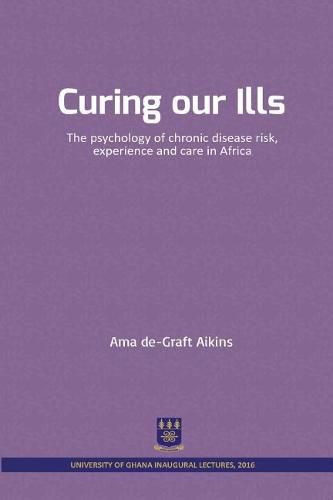Readings Newsletter
Become a Readings Member to make your shopping experience even easier.
Sign in or sign up for free!
You’re not far away from qualifying for FREE standard shipping within Australia
You’ve qualified for FREE standard shipping within Australia
The cart is loading…






This title is printed to order. This book may have been self-published. If so, we cannot guarantee the quality of the content. In the main most books will have gone through the editing process however some may not. We therefore suggest that you be aware of this before ordering this book. If in doubt check either the author or publisher’s details as we are unable to accept any returns unless they are faulty. Please contact us if you have any questions.
Millions of Ghanaians live with diabetes, hypertension, stroke, cancers and other major chronic diseases. Millions more are at risk of getting these conditions. Individuals living with chronic conditions experience many disruptions, especially at the early stages of diagnosis and adjustment. The disruptions are physical (medical complications), psychological (depression), material (impoverishment), social (stigma) and spiritual (struggles with faith and trust). These experiences have an impact on family life and resources, with primary caregivers bearing similar disruptions to their chronically ill loved ones. While chronic conditions cannot be cured, many individuals hope for a cure. This hope drives healthcare seeking across different sectors of Ghana’s vibrant pluralistic health system. When ‘hope for a cure’ meets ‘claims to cure’ within the herbalist and faith healing sectors, especially, the outcomes for individuals and their families can be catastrophic. The Ghanaian situation is mirrored in many African countries. It is estimated that African chronic non-communicable disease (NCD) prevalence, morbidity and mortality rates will rise faster than rates in Asia and Latin America over the coming decades. The long term and costly nature of NCDs has major implications for individuals, communities, health systems and governments.
In this inaugural lecture, Professor Ama de-Graft Aikins discusses the psychology of chronic disease risk, experience and care in Africa. She makes a case for why the problem of NCDs needs to be examined through a psychological lens. She draws on her independent and collaborative work on diabetes representations and experiences among Ghanaians in Ghana and Europe, and the broader African and global health literature, to highlight the complex multi-level context of chronic disease risk, experience and care. She presents a synthesis of the evidence through the concepts of physical ills and ideological ills, arguing that both are interconnected and, as a result, must be addressed through interdisciplinary approaches. She concludes by offering practical solutions for reducing chronic disease risk and improving the quality of long-term experience and care in Ghana, using examples from countries that have implemented successful NCD interventions.
$9.00 standard shipping within Australia
FREE standard shipping within Australia for orders over $100.00
Express & International shipping calculated at checkout
This title is printed to order. This book may have been self-published. If so, we cannot guarantee the quality of the content. In the main most books will have gone through the editing process however some may not. We therefore suggest that you be aware of this before ordering this book. If in doubt check either the author or publisher’s details as we are unable to accept any returns unless they are faulty. Please contact us if you have any questions.
Millions of Ghanaians live with diabetes, hypertension, stroke, cancers and other major chronic diseases. Millions more are at risk of getting these conditions. Individuals living with chronic conditions experience many disruptions, especially at the early stages of diagnosis and adjustment. The disruptions are physical (medical complications), psychological (depression), material (impoverishment), social (stigma) and spiritual (struggles with faith and trust). These experiences have an impact on family life and resources, with primary caregivers bearing similar disruptions to their chronically ill loved ones. While chronic conditions cannot be cured, many individuals hope for a cure. This hope drives healthcare seeking across different sectors of Ghana’s vibrant pluralistic health system. When ‘hope for a cure’ meets ‘claims to cure’ within the herbalist and faith healing sectors, especially, the outcomes for individuals and their families can be catastrophic. The Ghanaian situation is mirrored in many African countries. It is estimated that African chronic non-communicable disease (NCD) prevalence, morbidity and mortality rates will rise faster than rates in Asia and Latin America over the coming decades. The long term and costly nature of NCDs has major implications for individuals, communities, health systems and governments.
In this inaugural lecture, Professor Ama de-Graft Aikins discusses the psychology of chronic disease risk, experience and care in Africa. She makes a case for why the problem of NCDs needs to be examined through a psychological lens. She draws on her independent and collaborative work on diabetes representations and experiences among Ghanaians in Ghana and Europe, and the broader African and global health literature, to highlight the complex multi-level context of chronic disease risk, experience and care. She presents a synthesis of the evidence through the concepts of physical ills and ideological ills, arguing that both are interconnected and, as a result, must be addressed through interdisciplinary approaches. She concludes by offering practical solutions for reducing chronic disease risk and improving the quality of long-term experience and care in Ghana, using examples from countries that have implemented successful NCD interventions.